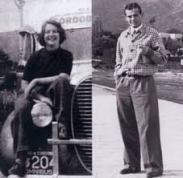(Fantastic) Photo: Pugliese signing a contract with his band. The singer in the flamboyant white suit is Roberto Chanel, who is featured in this post. The tall fellow in the middle is Alberto Morán.

Tango is often seen as the urban musical culture of Buenos Aires, in contrast with the more folkloric-sounding genres from the countryside, like chamamé, chacarera and zamba. However, there are also many tangos about the pampas and gaucho life. The following lyric is one of the best among them.
Ojos maulas (Cowardly eyes), lyrics by Alfredo Faustino Roldán.
Lloran las guitarras con suaves acordes
arden los fogones con luz de ilusión,
y hay dos ojos maulas que ingrato se esconden,
de un mozo tostado más lindo que el sol.
Él sabe el secreto
que guarda en su pecho
la infiel paisanita
que lo trastornó
y canta empañando de pena sus versos,
los tristes recuerdos de un día de amor.
The guitars are crying with soft chords,
the campfire burns with illusory light,
and two cowardly, ungrateful eyes hide
from a tanned lad, handsome like the sun.*
He knows the secret
she keeps inside her chest,
the cheating peasant girl
who drove him mad,
and he starts singing,
clouding his verses with grief,
the sad memories of a day of love.
“Fue una mañanita te acordás mi china,
cuando la puntita del sol asomó
te encontré solita, allá en las glicinas.
Vos me diste un beso y mil te di yo.
Te acordás mi china que amor nos juramos
y nos abrazamos con honda pasión,
y después que pronto se hicieron cenizas
las dulces caricias de aquella ilusión?”
“One morning, you remember my girl?**
When the sun began to come up,
I found you all alone, in the wisterias.
You gave me a kiss, and I gave you a thousand.
Do you remember that we swore to love each other,
and that we hugged with deep passion?
And then, how soon the sweet caresses of that love turned to ashes?”
(“Escuchá mis quejas y luego decime,
si han habido causas pa’ hacerme traición
y dejar que sufra y así me resigne
maneando los gritos de mi corazón.
Pero que voy a hacerle si se marchitaron
las lindas violetas que un día te di
y al dirse las pobres en mi alma dejaron
un puñao de angustias que gimen así.”)
(“Listen to my grudge and then tell me,
what was your reason to cheat on me,
and make me suffer and give up,
hobbling with the screams of my heart?
But what can I do, now that the beautiful violets I gave you one day have withered and as they died, the poor flowers left inside my soul a handful of sorrows that moan like this.”)
YouTube link (Pugliese-Chanel)
*I have kept this Spanish expression intact. A sun tan seems appropriate for the hard life of a gaucho.
**Mi china, literally: my Chinese/Asian girl. This was a gaucho way of calling a woman. I don’t think it had anything to do with China, but it might have to do with the shape of someone’s eyes. In that sense it’s also an affective nickname in Argentina more generally for someone with slightly East Asian-looking eyes.








You must be logged in to post a comment.